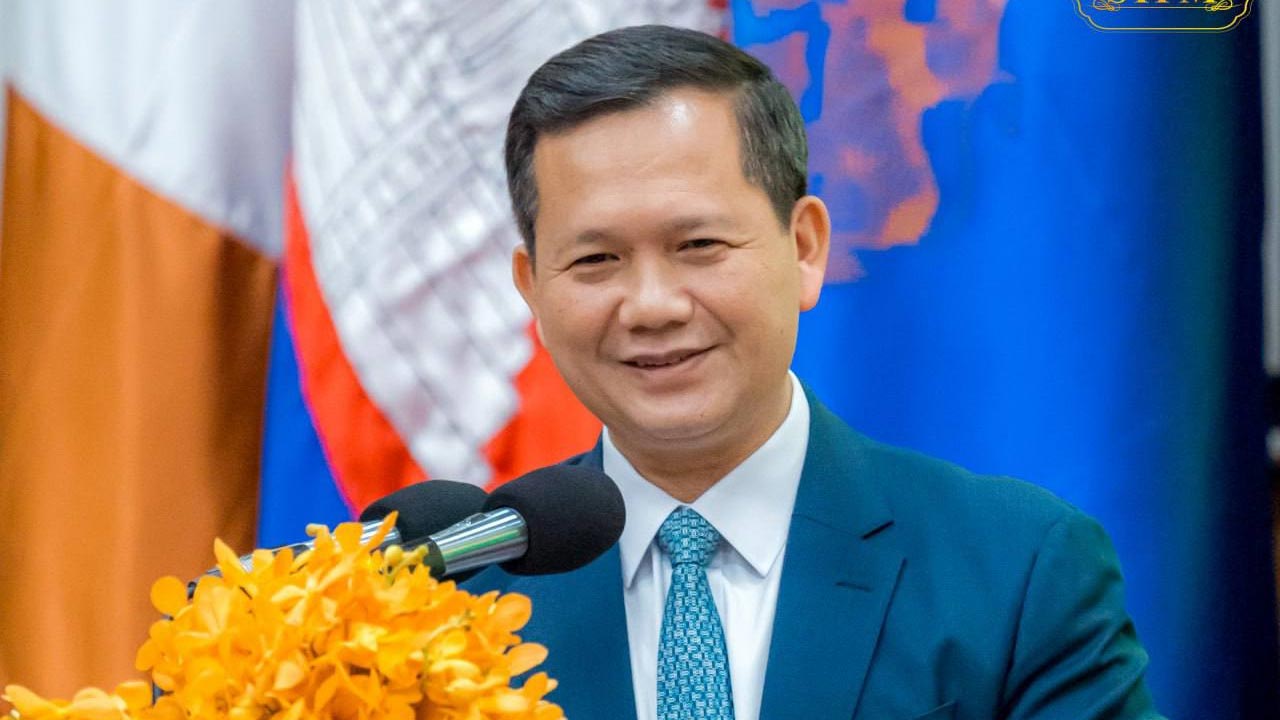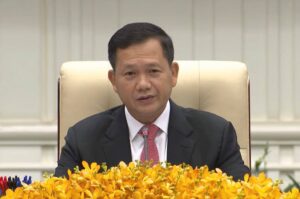Selected Comments Samdech Moha Bovor Thipadei Hun Manet, at the closing of the 2023 annual conference of the Ministry of Commerce and the work directions for 2024
 Selected Comments Samdech Moha Bovor Thipadei Hun Manet, at the closing of the 2023 annual conference of the Ministry of Commerce and the work directions for 2024
Selected Comments Samdech Moha Bovor Thipadei Hun Manet, at the closing of the 2023 annual conference of the Ministry of Commerce and the work directions for 2024
[Unofficial translations]
************
[1]
(1) Maintain/strengthen the existing market, expand the new market and ensure the quality and reliability of the goods
Maintain and strengthen existing markets, expand new markets as an approach that we must try and implement at all times. Saying is easy but hard to do. Firstly, maintaining the existing market. It is not that a country that we are doing business with will buy from us every year if we do not try to maintain our brand. This is a task to pay attention to. (And secondly) once the market opens, we must try to maintain the quality of goods and products and ensure reliability […] once we lose the markets, we not only lose the ability to export and earn extra income, but if we could not maintain the quality and reliability, we are suffering bad (affects) […] if we lost due to the buyer’s side, it’s one thing, but do not let it go because of the seller […]
(2) Increase product volume, increase export items and diversify new markets
If maintained, it helps to strengthen (access to market). Strengthening means (firstly)increasing the volume of exports of each product in the market. Secondly, increase the goods items for export. This means that the doors are open, and generally they never open 100 percent at a time. They let it open step by step. When we maintain product quality and trust in the Cambodian products, we provide opportunities for further expansion, especially some products, because, in many countries, in general, we cannot monopolize export of any products. More than 100 countries in the world produce similar goods for exports […] so, assuring quality is an important task. This reinforcement should focus on increasing the volume of exports of each product step by step […]
In this work, (firstly,) we continue to negotiate to increase the volume, and secondly increase the exporting goods. Sometimes we could just send a few items to a market and try to increase more items there later. An open market is an opportunity […] we need new markets, but we must keep the existing ones from disappearing […]; and (3) new market expansion is necessary. Market diversification helps us not to fall in impasse.It is said that eggs should not be placed in the same basket. If the basket is broken, all eggs are […] we need to diversify the markets. Of course, we export a lot to the United States and Europe, but we also export to other countries in the world. We should increase the target (of the export markets). We are now focusing exporting as many products as we can to the Arab world. Some countries have high standards. If certain products cannot be exported to certain countries, let us not be in impassable situation. We need to find other markets because sometimes (countries have) different standards and different types […]
(3) “Knocking on the door” proactive approach to maintain/strengthen existing markets and expand new markets
The task of maintaining, strengthening and expanding new markets is an approach that I had recommend to take care of. All of this requires us to act proactively. The pro-active spirit is not to be in waiting mode. Just knock on the door. Every time I go abroad, I always tell people in agriculture and trade that “one of you is to try to produce, and another is to try to sell.” However, it is not only people in agriculture who have to produce. Trade will sell not only agriculture products, but everything even from industry […] we cannot accomplish all that at once. We need to be consistent in all forms. By “knocking on the doors” means going to meet (with clients) face to face and to negotiate in person. In this regard, when I said we are doing the “attracting clients” method or marketing, […] apart from organizing business forums, where we focus on the economy with the private sector in each country, (we are also talking to) many companies […]
(4) Relevant ministries may send information/officials to the Kansai Business Association’s Cambodian Cultural Center for publicity
I advised the ministers who accompanied me (on foreign missions) not to be present with me. Take the opportunity to meet and work in person beforehand […] that’s proactive. Knock on the doors of both the private sector and the state sector […] do not forget that doing this is not different from marketing. It is just that marketing is at the state level […] the approach of knocking on doors is through holding exhibitions, road shows, interactions with (our) ambassadors and with partners. In Japan, a Kansai Business Association opens a Cambodian Cultural Center to promote Cambodia. So, there is no need for (CCC) to hold a seminar. The relevant ministries can send information to officials to help disseminate/publicize. Such advancement is an important task, a principle that we must continue […]
[2]
(5) Examine and adjust the internal structure of each institution to ensure work efficiency
[…] In terms of priorities, the key measures of the Royal Government in this term are to strengthen state institutions and (the procedure with which to) recruit new officials […] and to review the internal structure of the institution so that we can ensure (work efficiency) […] (the current) structure, roles and duties have been prepared (since) 20 years ago […] sometimes the subordinate institutions no longer have a need to be there anymore […] but at the same instance there are new needs elsewhere. Let us not be afraid to adjust that […] we train officials to step in (to do new works) because if we leave officials without proper jobs to do, our institution is heavy (with overstaffing matter) […] I encourage the Ministry (of Public Functions) to make an assessment. It is not that the system did not work before. It did work but how effective was it, we do not know. If through analyzing it we see that it is good enough, we do not need to change. But at least we have to look at the current situation in order to orientate it […]
(6) Monitor, evaluate and adjust the necessary places because it is a term to strengthen rather than to expand
Self-assessment means checking up. It is like a human being […] some people dare not to see doctors because once seeing a doctor s/he is told to go on diet […] we have to inspect the institution, where and how to prepare people properly for training. If we are not healthy, we cannot go to work. Tasks get busier, competition is tougher, and trade plays an important role in ensuring efficiency […] I think that you all in the Ministry have had a lot of experiences and can provide inputs in combination with the actual needs required by real competition and development in society. All ministries must carry out checking up, adjusting and/or strengthening wherever necessary to move forward, because this mandate is rather for strengthening than expanding […]
(7) Ministries and institutions ready to form a digital government and prepared for competition in the free market
The digital transformation is about setting up platforms, setting up platforms, and so on. I have seen that it has been organized since the time of HE Sun Chanthol, and HE Pan Sosak. Now it is under the leadership of Lok Chumteav Cham Nimul. Let’s continue. Not only here, all ministries and institutions, the whole government, are preparing the to become a digital government in the future […] if we do not get there, we are not up to date. It’s impossible to just say but do nothing […] let us strengthen ourselves so that we can fulfill the job. If we are not effective, our strength is not strong, anything we do will be difficult. Therefore, it is necessary to review and modernize the structure of staff training, as well as to organize the work system to respond to global competition. Free market does not pity us. They let us enter but we must survive on ourselves. They let us enter the competition, but we have to compete, and no one is waiting to help us forever […]
[3]
(8) Promoting the participation of the private sector through the Public-Private Sector Partnership (PPP) formula
The Public-Private Sector Partnership (PPP) formula is something that this government needs to push for more. The state plays a role in supporting the establishment of legal norms and supporting the private sector to participate. The state cannot play a substitute role for the private sector in promoting the development of the private sector or businesses. So, what I want and that I have mentioned in many forums, is how to set up a mechanism for the participation of the private sector in determining, discussing, formulating policies and implementing it. Previously yesterday, at the port of Sihanoukville as well as (when I was) in Japan, we discussed increasing the size and various initiatives in the Cambodian-Japanese relationship in the common economic sector, giving an important role to this PPP, with the participation of the private sector with both capital and expertise. Sometimes we assign the government officials to lead a mechanism that encourages the private sector. Without the private sector involved at all, we may not understand everything. I study economics, but I cannot do business. I can lay out a policy framework, but if I have to do marketing, I do not know how to sell […] we let the private sector participate and help strengthen the capacity of our private sector […]
(9) B2B and G2G trade opens the door, reduce legal or technical conditions which make it difficult for the private sector
Consider setting up a mechanism to engage in “knocking on door” approach, which must be accompanied by the private sector […] both in B2B and G2G. The state is open, but when it comes to implementation, it is not necessary for the state to involve. Now we have G2G involving in green trade […] some countries have set up government mechanisms but also do not block access from our private companies to work directly. Generally speaking, for us, like Samdech Techo often said, “white or black cat is a cat as long as they catch mouse.” The state can sell or the private can too […]we must open the door and reduce the requirements or conditions, standards, regulations or techniques that make it difficult for the implementation by the private sector. If it is too complicated, it will not happen. The private sector would not dare to do for fear of not understanding would lead to punishments. Speaking in unison, do it in a way to ensure the environment and in the legal framework but to the least so that they can do it […]
[4]
(10) Foreign trade is either determined by product or by market, domestic trade connects producers and consumers, and reduces imports
In my view, as far as foreign trade is concerned, we think of two formulas. The first formula is the product is the determinant factor. Another formula is market demand is the determinant factor. What is the product is the determinant factor? It means the products have special demand. For example, Kampot pepper, which has the geographical indication (GI) that no one can produce anywhere else, but us. There can be no Kampot in Japan […] a product that is of a special feature is rice. Well, we have to produce and we go to find the market. Meaning products first then market after.
The other is market first then products […] for example, I went to Arab, what they know best from Cambodia? I asked the prince who came to pick me up at the airport – “do you know about Cambodia?” Cambodia has never been there, but they’ve known Cambodia for the Sandlewood, which has a market there. This is a big product and we try to produce more and find a market for it. It has special feature. So, we do export based on the above two factors. Domestic trade, in particular, needs to increase the efficiency of connecting producers and consumers more effectively in order to reduce imports. This is an important task to increase support for Cambodian products and reduce imports in agriculture, tourism and others […]
(11) In 2025, to allocate budget for office equipment/furniture locally produced
Each year, we spend a lot of money to buy office furniture for national and sub-national government institutions. It costs a lot for each term. I have asked HE Dr. Aun Pornmoniroth to organize the working group and study one step ahead to prepare in principle so that from 2025 we can allocate some of the budget to spend on office furniture, by prioritizing on buying local products. This work takes time. The principle is there. The team is studying the experiences of several countries. There is a need to consult between the public and private sectors. We want to give priority to furniture (produced locally) […] for the upcoming year 2025, we are not going to close down people who do imports/exports 100%, but we will set some goals to help promote local products by allocating some budget to buy them to equip the state institutions […]
[5]
(12) Local producers need to improve product quality
We buy local products, but local producers have to be responsible. They must ensure that the materials used to supply national institutions are of good quality, usable and reasonable price. We will demand local producers to improve their capacity. Speaking in general, while given opportunities, they must strengthen themselves. If they do not strengthen themselves, we will lose. We want to help, but if they produce a chair that is easily broken up, then it is a problem. We help them to increase productivity.
I think this mechanism will be implementable because now we have secured a market. It requires the producers to start competing with each other. It should not be a good thing only by the encouragement from the state, but the quality of the local products has to be improved. As soon as the quality improves, it is not necessary for state to buy, but private sectors no longer need to buy from outside […] yesterday I met with the Japanese company, Toyota. They came to assemble cars in Cambodia. They asked the government to target the purchase of locally made cars. I said the government has an approach – “if the price is affordable and the car is good, we will” […]
[6]
(14) Quality assurance and not counterfeit products will help local producers
Ensuring the reliability of purchasing Cambodian products of good quality. We must make sure the level of quality is intact. We must not have counterfeit goods. We guarantee this to help those who really work hard to maintain quality. Each company is the same. If the quality is worse than others, […] we will certainly not buy from that shop again the following year. We will definitely buy from another sop. As for goods sold outside of Cambodia, they are to be tested a few times to see for sure that it is good. If it is bad just one time, it presents a problem. We must guarantee that (the goods are always of assured quality). I just saw that the Ministry of Trade has set this standard goal to ensure the quality on a regular basis. It is an important task […] this is the trust of customers that motivates products with quality within the country […]./.






